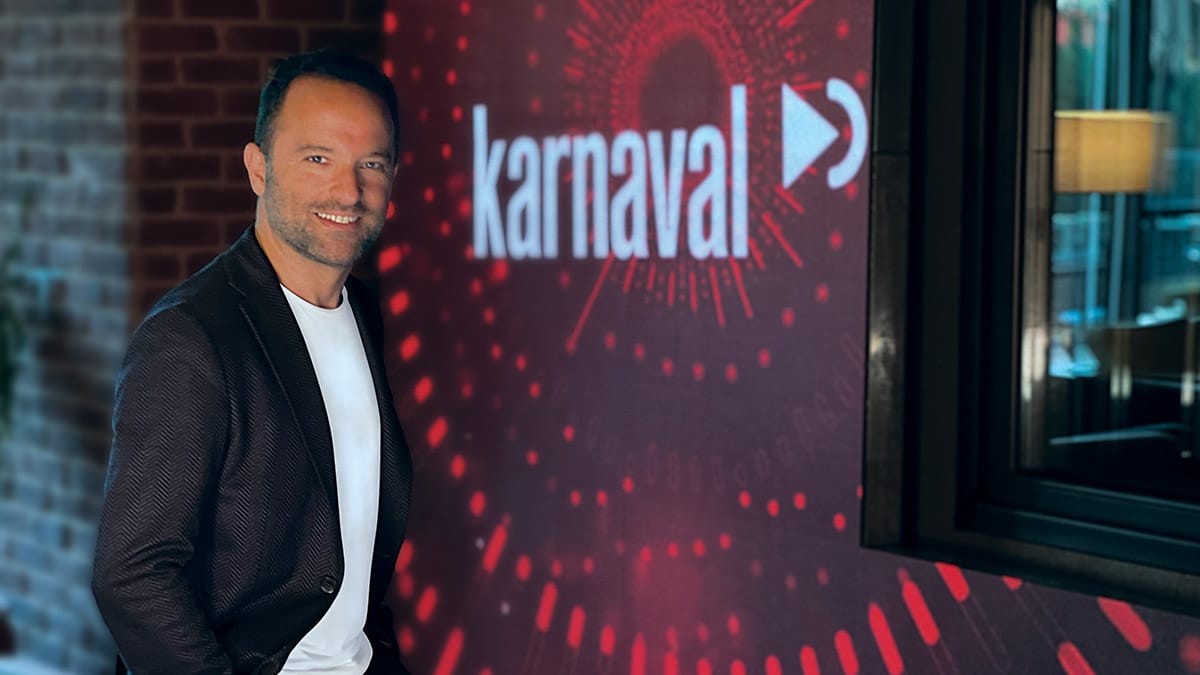Karnaval Media Group is the largest commercial radio broadcaster in Turkey, reaching more than 11 million listeners via nationwide and regional FM networks, satellite networks and the Karnaval internet radio platform. Burak Can, the group’s CEO since 2021, became passionate about radio during his first role with his university station, which, he says, changed his life forever. In this article, he shares a few of the secrets behind the group’s unique operating approach and insights into where he sees the industry going.
RedTech: What’s the radio market like in Turkey? How many stations or groups are there, and how does Karnaval Media Group differentiate itself to attract audience and revenue share?
Burak Can: Commercial radio launched in Turkey in the early 1990s, long after public radio began broadcasting. In just a few years, radio stations sprung up around the country, and being a radio programmer was one of the most attractive jobs at that time. Today, there are reportedly 1,090 radio stations broadcasting in Turkey; 36 of them operate nationally. There is stiff competition between the media groups operating national stations, since a big share of radio advertising goes to national radio stations.
Karnaval Media Group has the largest audience and market share in Turkey, with its competent programmers and advanced technological infrastructure serving five terrestrial stations with different radio formats. These include Super FM, Metro FM, Joyturk, Joy FM and Virgin Radio. We also have digital stations such as Borusan Klasik, JoyJazz and Radio Mydonose. KMG also sets itself apart from its competitors through our internet platform, Karnaval. The synergy that Karnaval holds between terrestrial and online assets creates a diversified environment both for listeners and advertisers.
The synergy that Karnaval holds between terrestrial and online assets creates a diversified environment both for listeners and advertisers.
RedTech: How have recent events such as the health crisis and geopolitical issues impacted your operations?
Can: Over the years, there have been geopolitical or social incidents in Turkey that impacted advertisers’ media buying behaviors, but nothing like COVID-19. During the health crisis, radio businesses here faced difficulties caused by the drastic decrease in advertising. Although, in general, many broadcast operations managed to continue and there was no significant audience loss during lockdown, the difficulties in monetization forced most radio businesses to lower their operational costs. The radio industry was tested because the advertisers perceived that radio was simply an outdoor medium, accessed mainly in cars. And, since there were few cars on the streets during lockdown, advertisers cut budgets, despite the fact that ratings showed that the audience kept listening to their favorite stations at home.
RedTech: With the increasing competition from online audio, both streaming and on-demand, how is Karnaval Media Group sustaining its audience loyalty and advertising support?
Can: Karnaval Media Group has an advantage in the market since it has developed a synergy between online and offline mediums in one body. Our goal is to drive audience engagement through different distribution channels. Online audio gives an opportunity to increase time spent listening and enriches the radio consumption experience. Expanding the distribution channels and delivering both streaming and on-demand content leads to increasing numbers of listeners by triggering cross-listening behavior. Listener engagement increases throughout the day, so does loyalty. From a business perspective, KMG differentiates itself in the market by delivering online and offline advertisement solutions. Besides the media buying experience, we also provide custom-made projects and position ourselves as a solution partner for advertisers and media agencies.
RedTech: What are the biggest challenges facing radio and audio in Turkey today?
Can: Increased competition in the digital audio environment is the biggest challenge, but also the biggest opportunity for radio. Radio programmers need to find novel ways to encourage interaction with younger audiences. The majority of the population is still attracted to radio. However, building loyalty among the youth is not easy. Young individuals are exposed to messages from different channels and are easily encouraged to change the medium they are using. That’s why radio should focus on its strong areas like the capability of curation, influencing the community, entertaining and informing audiences live. Radio should define itself not only by the format, but by the meaning of its existence in listeners’ lives. My own definition about radio is: “An audio medium where people from different backgrounds with common tastes come together and share the moment.” In that sense, you can imagine how radio becomes more attractive by using digital products and technologies.
RedTech: What’s happening to time spent listening in the radio market in Turkey, and how are you reimagining your radio stations to grow your share of this TSL?
Can: Fortunately, after the lockdowns, the audience embraced their favorite stations more in search of entertainment. We can clearly see and feel that the audience’s reaction reminds us of the 1990s, when radio was a shining star. Turkey’s radio industry is growing both in terms of time spent listening and budget spent.
RedTech: How are you using technology and software to strengthen your business, either to help you grow or to cut costs?
Can: Technology is helping the radio industry’s operational efficiency more than ever. Before the COVID-19 pandemic, Karnaval Media Group made significant investments in broadcast technologies that helped the company easily adapt to the challenging circumstances. Having the technological capabilities encouraged the entire team to be more productive and creative. Improving technological infrastructure helps reduce operational costs and provides opportunities to develop complete sales projects, especially by using digital product features.
RedTech: Can you see a future for music radio in face of competition from Spotify and other music streaming services?
Can: We can’t ignore music streaming platforms’ power in reaching younger audiences. Curation is highly effective, and lean-forward entertainment behavior demands time and effort. This is where radio should come into the picture. Music curation supported by the magic touch of live radio DJs distinguishes radio from the music streaming platforms. It’s not only what you deliver; it’s the approach you take that makes people pay attention to you!
RedTech: What is the attitude of advertisers in Turkey to radio as a medium? How do advertisers know they are getting results with their radio advertising in Turkey?
Can: In Turkey, Kantar Media manages radio ratings. The company uses the Computer Assisted Telephone Interviewing methodology to collect data. Some advertisers criticize this methodology, claiming that it provides the results mainly based on audience perception but not real listening. However, when we study the historical data, it’s possible to see that the results are in line with both the common perception and the digital listener traffic of each station.
The challenge for radio people in Turkey is to break away from outdated ideas about radio. For example, the data shows that radio is listened to more during the day in Turkey, but advertisers often believe that drive time is better for distributing marketing messages.
Similarly, radio listenership on weekends is almost the same as on weekdays, but advertisers’ requests for weekend slots are quite low compared to weekdays. In our group, we spend a lot of time studying the data to verify the strength of our monetizable assets and define their potential ROIs for customers. Data-oriented sales strategy strengthens business relationships with the advertisers and encourages them to spend more budget on radio. In general, I believe radio professionals should spend more time on improving data-driven commercial relationships with the industry.
RedTech: What’s the future of podcasting in Turkey? Is on-demand audio growing audiences and revenue in the country?
Can: There is certainly increasing interest in producing podcasts in Turkey. It’s not only individuals podcasting, but also big media companies, and recently, podcast networks have been producing and distributing podcasts via different distribution channels. Since it’s a relatively new medium, we cannot measure the size of the podcast market in Turkey yet. However, we can see the increasing interest of advertisers in this medium.
Podcasting is one of the biggest business opportunities for radio stations. In a harsh competitive environment in the audio distribution business, podcasting gives a chance to deliver on-demand audio content rather than music. Radio, by nature, has the know-how and the resources to produce and distribute on-demand talk content. At KMG, we are focusing on growing our podcast business in 2023. In addition to having the production and distribution capabilities, we also generate monetizable podcast content. Having five terrestrial radio stations, we can also promote and/or distribute our own podcast content via traditional radio, reaching millions of listeners. That’s a very impactful asset for podcasters to build their audience.
Podcasting is one of the biggest business opportunities for radio stations.
RedTech: Is your network using the cloud to manage its operations, or is most of the content and information held on site, and how are you protecting your IT operations from a cybersecurity angle?
Can: We use both ways to manage our operations. We store some of the data in the cloud, and some onsite. We have also protected and backed up our entire repertoire of content and information at different locations. In addition, we are currently working on updating our cybersecurity policies to improve data protection in line with the technological developments.
RedTech: What other major trends do you see impacting the radio industry both in Turkey and globally?
Can: Individuals’ media consumption behaviors have changed dramatically in the last 10 years with the rise of social media, which decentralized content production and distribution. Media companies have been trying to restructure themselves to survive in this new media environment. Radio has always had an advantage because it’s already been a highly efficient medium in terms of production costs. If radio can become more social, that’s a huge opportunity for the medium. With the rising awareness around audio, the radio industry can provide individuals with the social audio network they need to deliver their content. Digitization could be seen as an enemy since it provides an environment for new communication channels to grow. But live entertainment will live forever, giving the radio industry a big opportunity to renew itself each day.
Similarly, with the rise of connected cars, one might consider radio in danger since there is access to other mediums in cars. But if the radio industry develops their operations together with the technology providers, this can also be an opportunity for increased penetration of online radio in cars.

